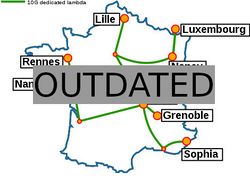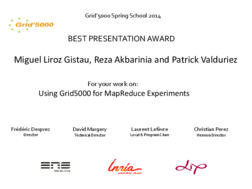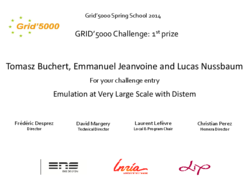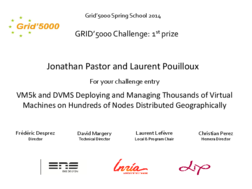Grid5000:Home: Difference between revisions
No edit summary |
No edit summary |
||
| Line 10: | Line 10: | ||
* provides '''access to a large amount of resources''': 1000 nodes, 8000 cores, grouped in homogeneous clusters, and featuring various technologies: 10G Ethernet, Infiniband, GPUs, Xeon PHI | * provides '''access to a large amount of resources''': 1000 nodes, 8000 cores, grouped in homogeneous clusters, and featuring various technologies: 10G Ethernet, Infiniband, GPUs, Xeon PHI | ||
* '''highly reconfigurable and controllable''': researchers can experiment with a fully customized software stack thanks to bare-metal deployment features, and can isolate their experiment at the networking layer | * '''highly reconfigurable and controllable''': researchers can experiment with a fully customized software stack thanks to bare-metal deployment features, and can isolate their experiment at the networking layer | ||
* '''advanced monitoring and measurement features for networking and power consumption''', | * '''advanced monitoring and measurement features for traces collection of networking and power consumption''', providing a deep understanding of experiments | ||
* '''designed to support Open Science and reproducible research''', with full traceability of infrastructure and software changes on the testbed | * '''designed to support Open Science and reproducible research''', with full traceability of infrastructure and software changes on the testbed | ||
* '''a vibrant community''' of 500+ users supported by a strong technical team | * '''a vibrant community''' of 500+ users supported by a strong technical team | ||
Revision as of 23:48, 22 January 2015
|
Grid'5000 is a large-scale and versatile testbed for experiment-driven research in all areas of computer science, with a focus on parallel and distributed computing including Cloud, HPC and Big Data. Key features:
|
Latest publications from Grid'5000 users
Five random publications that benefited from Grid'5000 (at least 2777 overall):
- Romaric Pegdwende Nikiema, Marcello Traiola, Angeliki Kritikakou. Impact of Compiler Optimizations on the Reliability of a RISC-V-based Core. DFT 2024 - 37th IEEE International Symposium on Defect and Fault Tolerance in VLSI and Nanotechnology Systems, Oct 2024, Oxfordshire, United Kingdom. pp.1-1. hal-04731794 view on HAL pdf
- Ismaël Tankeu, Geoffray Bonnin. Towards Characterising Induced Emotions: Exploiting Physiological Data and Investigating the Effect of Music Familiarity. MuRS 2024: 2nd Music Recommender Systems Workshop, Oct 2024, Bari, Italy. hal-04703972 view on HAL pdf
- Hugo Thomas, Guillaume Gravier, Pascale Sébillot. One-shot relation retrieval in news archives: adapting N-way K-shot relation classification for efficient knowledge extraction. KES 2024 - 28th International Conference on Knowledge-Based and Intelligent Information & Engineering Systems, Sep 2024, Seville, Spain. pp.1060-1069. hal-04708239 view on HAL pdf
- Houssam Elbouanani, Chadi Barakat, Walid Dabbous, Thierry Turletti. Fidelity-aware Large-scale Distributed Network Emulation. Computer Networks, 2024, 10.1016/j.comnet.2024.110531. hal-04591699 view on HAL pdf
- Elana Courtines, Georges da Costa, Patricia Stolf. CuttleBench: A benchmarking tool for comparing programming languages' performances. Toulouse 3 Paul Sabatier. 2023. hal-04610856 view on HAL pdf
Latest news
Grid'5000 tutorial days in Lille
We are happy to let you known that tutorials around Grid'5000 will be organized in Lille on November 20th, 2014, with a few seats available for people outside Lille. All information on the dedicated web page.
Grid'5000 spring school now finished
The Grid'5000 spring school took place between June 16th, 2014 and June 19th, 2014 in Lyon. Three awards were given for presentation or challenge entries (the challenge entries ended as a tie):
|
Best presentation award to Miguel Liroz Gistau, Reza Akbarinia and Patrick Valduriez |
Best challenge entry to Tomasz Buchert, Emmanuel Jeanvoine and Lucas Nussbaum |
Best challenge entry to Jonathan Pastor and Laurent Pouilloux |
Grid'5000 sites
Current funding
As from June 2008, INRIA is the main contributor to Grid'5000 funding.
INRIA |
CNRS |
UniversitiesUniversity Joseph Fourier, Grenoble |
Regional councilsAquitaine |





